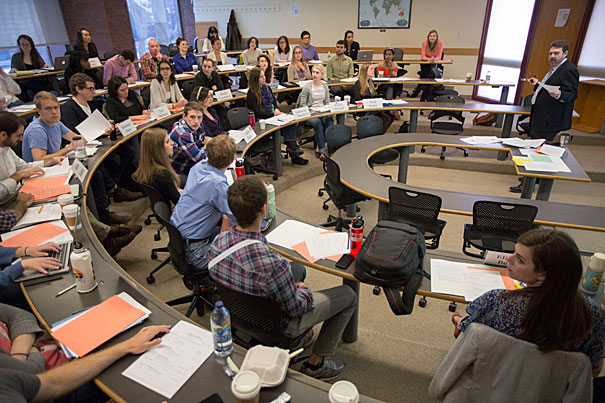
“In the real world, the pieces of a problem gang up on you. Spring Exercise gives the students vital practice at dealing with that. Of course it’s stressful. But it’s a great warm-up for professional practice,” said Jack Donahue, the Raymond Vernon Senior Lecturer in Public Policy, who is leading the opportunity for first-year master in public policy students.
Kris Snibbe/Harvard Staff Photographer
They spring into action
During fast-paced, two-week exercise, Kennedy School teams seek tangible solutions to pressing problems
As they move into final exams and toward summer break, a cohort of Harvard Kennedy School (HKS) students have a pressing new assignment: identifying specific strategies for improving public education in Boston.
Spring Exercise provides the opportunity for first-year master in public policy (M.P.P.) students to put into practice what they’ve learned in their core subjects of economics, statistics, management, ethics, politics, and finance during their first two semesters at the School.
“In the separate courses in the M.P.P. core, the students take on public problems one piece at a time — the economics piece, the ethics piece, the management piece, and so on,” said Jack Donahue, the Raymond Vernon Senior Lecturer in Public Policy and M.P.P. program faculty chair. “In the real world, the pieces of a problem gang up on you. Spring Exercise gives the students vital practice at dealing with that. Of course it’s stressful. But it’s a great warm-up for professional practice.”
For two weeks, the students delve deeply into the dynamics of a real-world challenge unveiled to all participants on the first day of the exercise. Past topics have ranged from global warming to the H1N1 flu pandemic. This year’s task is to identify areas in which the Boston Public Schools can improve — an issue emphasized by both finalist candidates in the 2013 Boston mayoral campaign — and offer realistic solutions to their problems. It’s not a competition, but at least one team will be given the opportunity to present ideas to Mayor Marty Walsh.
“HKS is a professional school,” said Donahue. “Spring Exercise is where the ‘school’ part starts to recede and the ‘professional’ part moves to the foreground. The sheer pace of the exercise is probably the biggest challenge for the students. Every year there are a few students who happen to know something about the topic, but most go from the first step to a fully developed policy proposal in 12 days.”
“When you’re trying to answer questions that people spend their whole lives trying to solve in only two weeks, the complexity is much more pronounced,” said student Stacey Harris. “On the positive side, I’ve learned a ton.”
“One challenge that I didn’t expect was how to balance presenting a strong recommendation on behalf of my team while still leaving flexibility for the mayor to take a different idea and run with it,” said student Christine Kidd. “Without knowing Mayor Walsh, it’s hard to know exactly how to weigh these criteria. For example, does it matter to him whether the course of action sees results in the next two years, or is he willing to take on an alternative that might have more sweeping impact but take longer to implement?”
The students said that while the task is grueling, the experience is invaluable.
“It mimics the real world, where we all have to deal with problems we don’t necessarily want to deal with and know nothing about,” said student Peter Krul. “You have to adapt quickly. Another important component of the Spring Exercise is that you also have to rely on your team. Working with others and facing firm deadlines is not easy. But again, most of us will have to work in teams once we go back to our professional careers.”
Donahue is impressed with the effort the students put forth.
“I love to see how very good our students are, and how well they can do on a big challenge when we give them a chance,” he said. “The Spring Exercise is where the best of them display hints of real mastery.”




